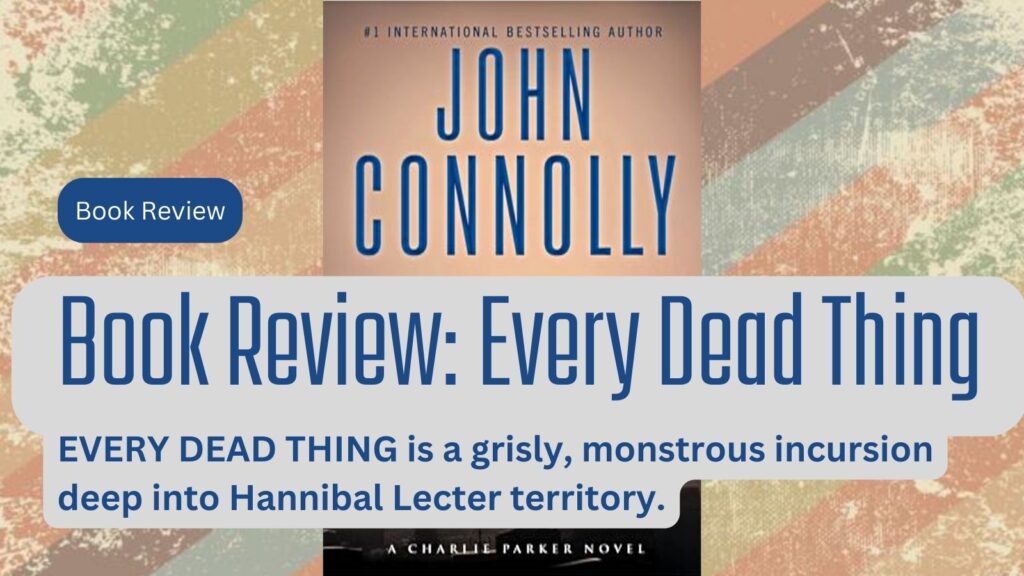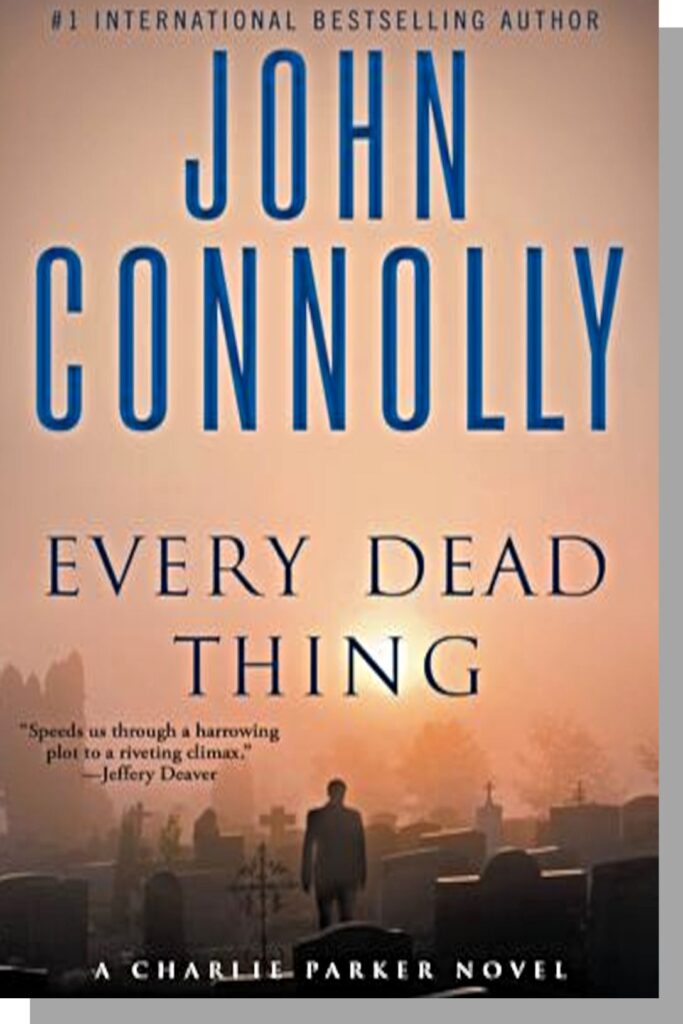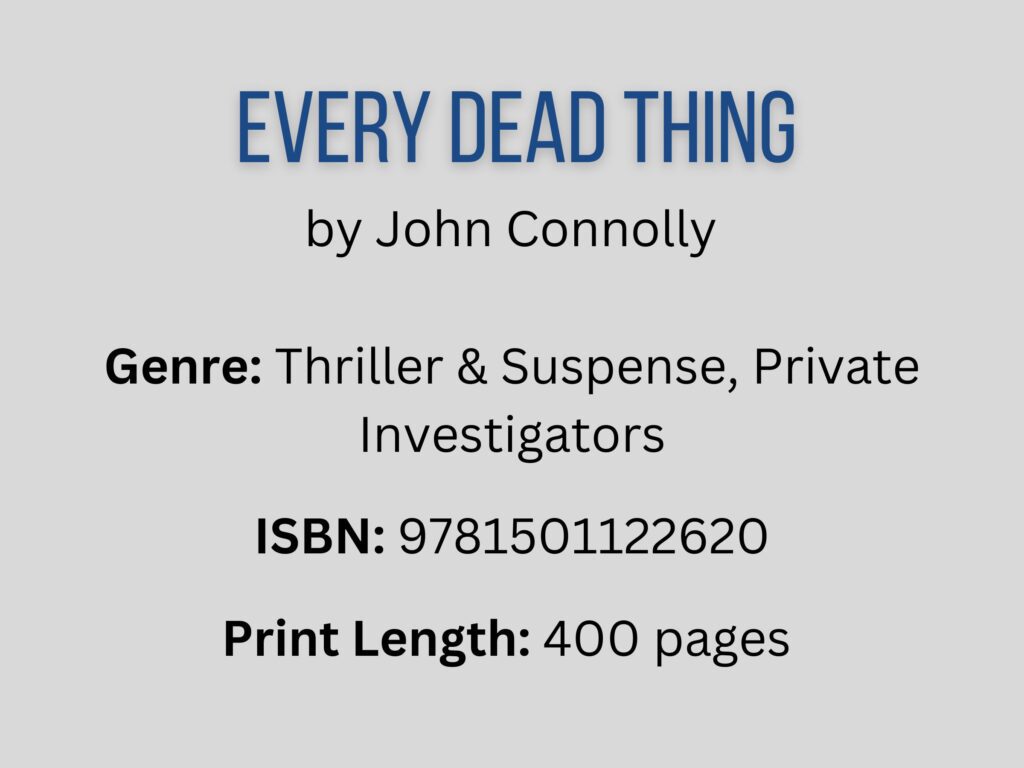
Haunted by the unsolved brutal murders of his wife and young daughter, ex-NYPD detective Charlie Parker embarks on an odyssey that leads him to the heart of organized crime, an old black woman living in a Louisiana swamp who hears the voices of the dead, and to a serial killer unlike any other.
I started reading Every Dead Thing by John Connolly and had one thought. How had I, a crime fiction book reviewer, never read John Connolly before? It has everything I look for in a good detective novel. The prologue, overuse of metaphors, the gritty prose, and sharp dialogue. I was beyond impressed by Connolly’s tone and quality after the first dozen pages.
There is a reason I’d never read Connolly before. Of course, there is. I’d heard of Connolly, obviously. He’s been a bestselling author for quite a long time. I’d even heard of the Charlie Parker series. But I’d been reluctant to pick up a Connolly novel because I’d read several reviews of his books. Yes, the reviews had been reliably favorable, but most of them included references suggesting this series (maybe Connolly’s work in general) have a paranormal or supernatural undercurrent. Other reviews described the series as a fusion of supernatural thrillers and horror.
Nothing against those genres, they simply aren’t in my sphere of interest, especially horror. When I think of the horror genre, I think of Stephen King. King is a fine and successful writer, but after reading a few of his books, I found the horror genre just doesn’t appeal to me, no matter how well written. So, I had avoided Connolly for the same reason I don’t read King. But recently, while browsing the titles on NetGalley, I read the book description of Connolly’s newest Charlie Parker novel, The Instruments of Darkness (Charlie Parker #21). I found the description intriguing enough to request an advance review copy. Then, I decided I should read some past Charlie Parker novels to gain some background on the character. Naturally, I chose Every Dead Thing, the first book in the series. And after reading it, I can’t imagine how I have denied myself the pleasure of reading Connolly’s work until now.
The book opens with a lengthy prologue. One of the best I’ve ever read. I suppose the quality of the prologue should surprise no one. That’s because, according to Connolly’s introduction to the book, he spent six months writing and rewriting it, unwilling to continue with the rest of the book until satisfied he got it just right. I think he succeeded. The value of prologue is its relevancy to understanding the Charlie Parker character. He’s a man haunted by the murder of his wife and young daughter because he knows he failed them and feels heavy responsibility for their deaths. The evening the murders occurred, Parker had argued with his wife and then left and had gone to a bar to get drunk. He returned hours later to find them horrifically murdered and posed in a grisly, shocking way. This background informs much of who Parker is as a character and his motivations. Unlike many prologues I’ve read, this one grabs you and pulls you right into the story.
Parker is another former police detective turned private investigator, having left the NYPD after the death of his wife and daughter and a descent into his own private hell. Similarly to Lawrence Block’s Matthew Scudder, Parker is an unofficial private investigator with no interest in obtaining state licensing. And like Scudder, Parker reminds me a lot of my favorite private detective character, Robert B. Parker’s Spenser, especially his wise-cracking personality. But Parker is a unique character in his own right with his own flaws. As a protagonist, he is both broken and twisted to the extreme.
The story continues to unfold with Parker trying to apprehend a bail jumper, but he ends up seeing the man and his girlfriend shot and killed outside the girlfriend’s residence and then seeing the killer shot dead. From there, Parker takes on a missing person case as a favor to a former NYPD partner that turns out connected to the opening murders and chasing down a serial killer. Finally, Parker moves on from that case after its resolution into pursuit of the serial killer called “The Traveling Man” who killed his family, and that chase takes him from New York south to New Orleans.
As mentioned, I don’t read books with supernatural elements, fantasy, or science fiction. I simply have no desire to read about other worlds when there is already so much more going on in this one than I can handle sometimes. However, the supernatural elements Connolly features here aren’t the distraction from realism I might have expected. They aren’t fantastical in that his characters don’t even seem certain of what they are experiencing. I think what they are experiencing is not paranormality as much as simply the existence of evil, which, in my experience, is something undeniably real and an existing force in the world. In a similar way, I can’t agree much with the opinions I’ve read that Connolly’s books are speculative fiction regarding some fusion with the horror genre. What his prose describes is certainly dark, but again, it’s simply the evil perpetrated by evil people on others in the same ways those of us who read true crime books understand serial killers doing what serial killers do.
I feel the plot works here as a psychological thriller and detective story without the over-complication of supernatural or horror themes. It’s simply the existence of evil and the evil people we view here, and that’s about as real as it gets. The ultimate villains in the book aren’t demons. They are evil human beings bent on visiting evil on other human beings. There’s nothing supernatural about that. It’s all too common in the world we inhabit.
Connolly’s impressive writing, realistic characters, and a dark, convoluted plot are all on full display here. I enjoyed how the story played out and how the investigations took surprising turns. I came away very satisfied with my first Charlie Parker novel, and a little horrified as well, even though I don’t consider it a horror book. Fans of crime thrillers and detective mysteries able to stomach the intensely dark, explicit narratives will find this a worthy read.
Happily, I’ve just discovered a massive series already written and just waiting for me to dive into. I liked Parker and want to get to know him more. After finishing this novel, I immediately purchased Dark Hollow, the second in the Charlie Parker series. While I haven’t yet received the publisher’s approval on NetGalley for the advanced copy of The Instruments of Darkness, I’m certain I’ll read the book at some point even if it’s after working through the other nineteen existing books in the series first.
Simon and Schuster first published Every Dead Thing in October 1999. I purchased the copy used for this review, which represents my honest opinions.
Book rating: ★★★★


One thought on “Every Dead Thing by John Connolly Review”
I enjoyed your article. I’m one of his biggest fans and I agree with you regarding the existence of evil in his characters. They’re not ghosts but evil in human form with some type of power derived from hell. I don’t ever want his books to end. Thank you for your words.